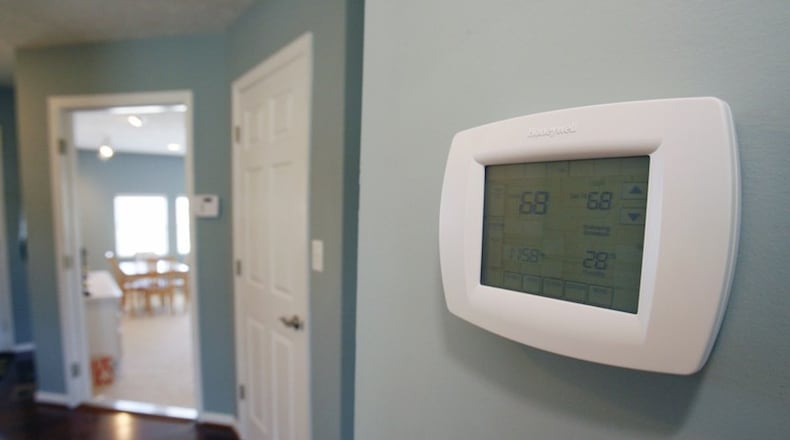“So far this month, average temperatures have been about 1 degree warmer than average, and 1 degree warmer than December 2016,” he said. “As you can imagine, this month’s average temperature could change dramatically depending on the weather over the next 10 days.”
MORE: Hamilton natural gas rates climbing 5 percent starting Dec. 1
Freedman added, “our meteorologists are forecasting temperatures to be about two degrees colder than normal in January 2018, and about one degree colder than normal in February 2018.”
Winter heating bills can vary based on many factors like outside temperatures, thermostat settings, the cost of natural gas supply and whether a customer has made energy efficient improvements to the home.
MORE: Hamilton councilman argues city should allow medical pot
Duke Energy offers free programs and tools to help customers better understand and manage their monthly energy expenses. Budget billing gives customers better control over their energy spending by establishing predictable monthly payments.
MORE: This Hamilton church is helping the city in many ways. Here are a few.
The company sends High Bill Alerts to customers when adverse weather may lead to a significant increase in energy costs.
Nathan Perry, utility business manager for the city of Hamilton, said customers serviced by the city will see a slight increase in their bills over the winter months.
“We consider the winter months to be November through March,” Perry said. “So I looked at the average costs for those months in 2016 to 2017 and then looked at usage rates projected for 2017 to 2018 for the same months. The average customer bill for 2016 through 2017 was $146 and we are projecting that for 2017 to 2018 the bill will be $157 on average so there is an expected $11 increase or 7.5 percent. This includes electric and gas in those bills.”
Perry said the projections are based on actual usage rates and can be higher or lower depending on what consumers are using during the billing time period.
Both Perry and Freedman explained that there are multiple tips consumers can deploy to help mitigate heating costs during the winters, ranging from controlling the thermostat to properly insulating their residence.
“You can save as much as 10 percent a year on heating and cooling by simply turning your thermostat back 7 to 10 degrees from its normal setting for 8 hours a day,” Freedman said. “In the winter, set the thermostat to 68 while you’re awake and set it lower while you’re asleep or away from home.”
For those who are struggling to pay their bills, there is some help available. Approximately 610 Butler County households have been kept warm so far this season through Supports to Encourage Low-Income Families (SELF’s) Winter Home Energy Assistance Program (HEAP).
Launched Nov. 1, the HEAP program is continuing to take appointments for the program that provides emergency utility assistance to low-income families through March 31, 2018, according to Rebecca Palen of the agency.
She explained that in order to qualify for the Winter Crisis Program, a household must be threatened with disconnection, have been disconnected or have less than a 25 percent supply of bulk fuel.
The household must also have a gross income at or below 175 percent of the federal poverty level. For a family of four, the annual income must be at or below $43,050. From November 2016 through March 2017, more than 104,799 Ohioans were helped by the program statewide.
Appointments for HEAP in Butler County can be made by calling 513-868-9300, option 1 or 888-432-7022.
In Warren County, HEAP assistance is available by calling toll free at 1-866-747-1042 for an appointment or to hear times for walk-in assistance.
Winter heating tips:
Turning up the heat is necessary in the winter months to keep out the cold Ohio weather. There are a few simple ways for you to make sure your home is efficiently keeping the warm air in and the cold air out.
• Set thermostats to 68 degrees when not at home and at night.
• Run ceiling fans on low, and flip the switch so they are rotating clockwise.
• Keep drapes and blinds open during sunny days to let heat in.
• Replace air filter regularly to ensure clean and consistent air flow.
• Minimize use of electric space heaters, except for limited or temporary spot heating. Turn space heaters off when leaving the room.
• Ensure floor registers are not blocked.
• Seal leaks: Seal the air leaks around cut-throughs for pipes, gaps around chimneys and recessed lights in insulated ceilings, and unfinished spaces behind cupboards and closets; add caulk or weatherstripping to seal doors and windows.
• Insulate: Install the proper amount of insulation in exterior walls, roofs or ceilings, and floors above cold spaces. If you do not currently have insulation in one of these areas, installing insulation will cut your energy bills dramatically.
• Cover drafty windows: Use a heavy-duty, clear plastic sheet on a frame or tape clear plastic film to the inside of your window frames during the cold winter months. Make sure the plastic is sealed tightly to the frame to help reduce infiltration. Install tight-fitting, insulating drapes or shades on windows that feel drafty after weatherizing.
SOURCES: Duke Energy and the city of Hamilton
About the Author
